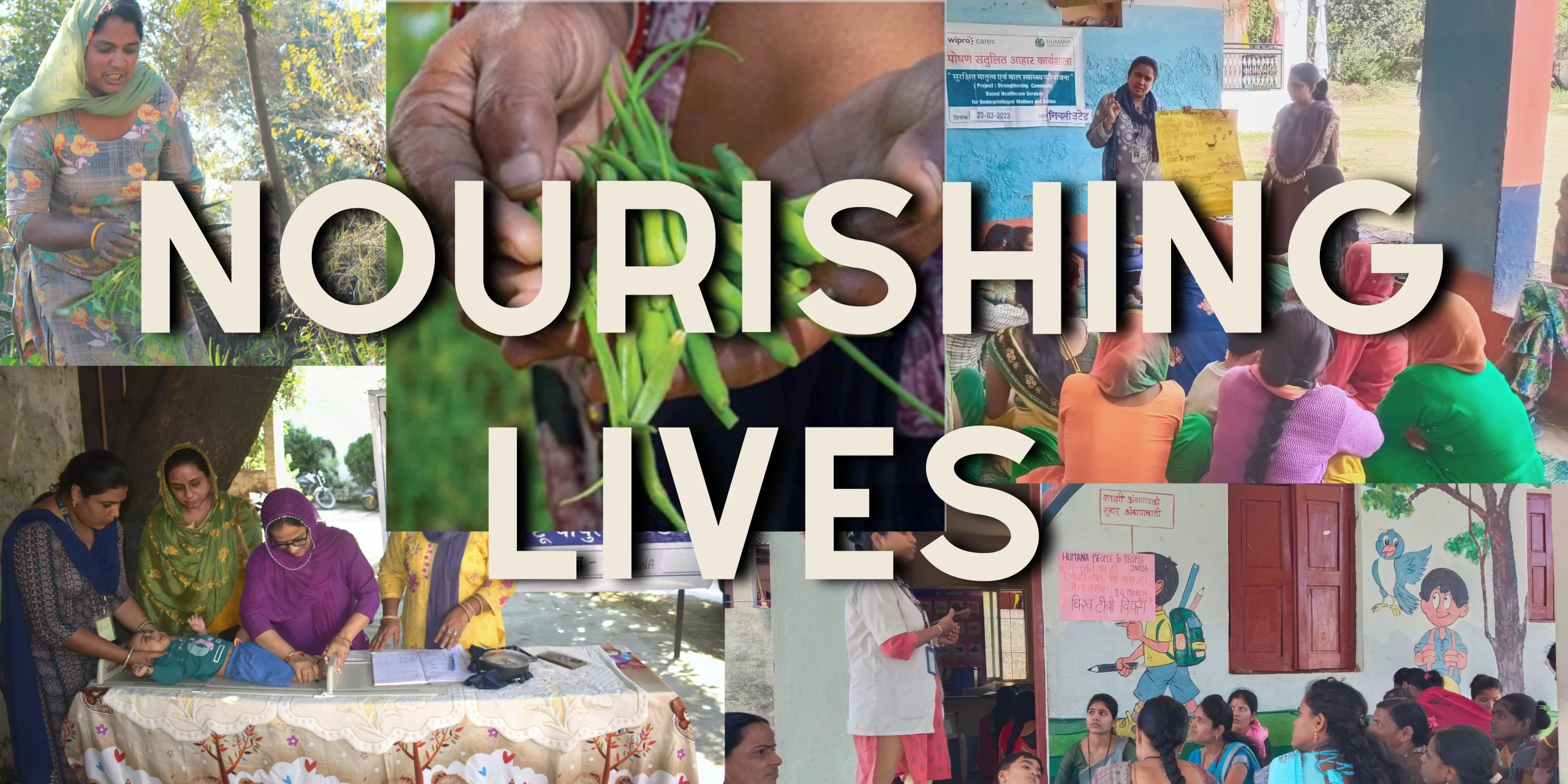Nourishing Lives

Written By: Sumer Singh Yadav and Shrutika Mathur
Nutrition is a fundamental aspect of human life, and its significance is amplified during pregnancy and early childhood. Adequate nutrition during these critical stages can have a lifelong impact on a child’s physical and mental development. Inadequate nutrition can lead to a range of health issues for both mothers and babies, including stunted growth, developmental delays and a higher susceptibility to diseases. Malnutrition has significant consequences for early childhood development as well as on the health and overall wellbeing of adults. The National Family Health Survey (NFHS) 2019-2021 reflected a rise of anaemia in women and children. 67.1 per cent of children aged 6-59 months were anaemic (as compared to 58.6 per cent in the previous round of the survey). 59.1 per cent of women from ages 15-19 were found anaemic as compared to 54.1 per cent in 2015-16. These differences are starker in the rural regions.
Holistic Nutrition which is popularly known as POSHAN Abhiyaan, or National Nutrition Mission is the Government’s flagship programme to improve nutritional outcomes for children, pregnant women and lactating mothers. The Ministry of Women and Child Development celebrated the 6th Rashtriya Poshan Maah throughout September 2023. This year, the objective is to comprehensively tackle malnutrition through a life-cycle approach. The focal point is to cultivate widespread awareness concerning critical human life stages: pregnancy, infancy, childhood and adolescence.
Cognizant of the nutritional deficiencies of our population and the government directives, HPPI is working to enhance healthcare access for pregnant and lactating mothers, especially in rural and underserved areas. We partner with local health facilities and provide support to women to access healthcare facilities for antenatal check-ups and childbirth. The HPPI health project team works closely with the Primary Health Centres (PHCs). The trained project staff plays a key role in health awareness of the community, motivating the patients towards seeking institutionalised treatments through PHCs and counselling the pregnant women and their caretakers. Even post-delivery, the staff conducts regular home visits in counselling and mobilising the mothers about timely vaccinations.
Apart from the health awareness and community mobilisation activities, HPPI’s projects also organise training programmes for Accredited Social Health Activists (ASHAs) and Auxiliary Nursing Midwifery (ANMs) in all the PHCs in the project areas. These are very helpful for all the community health workers in building their capacity and in helping them provide quality services to the residents of the villages in the catchment area.
Our fight against malnutrition and poor outcomes of mother and child health has progressed to cover a larger number of Anganwadi Centres (AWCs) and Health Sub Centres (HSCs) in several states and districts. Strengthening AWCs as the smallest key service-delivery units located at every village for small children and women for making primary healthcare services is significant. During 2022-23 9,717 children and 6,966 women were supported through AWCs and 283 malnourished children put under treatment and cured. The detection of malnourished children, early registration of pregnant women, identification of any high risks, and their timely management have been possible in the targeted AWCs and HSCs with HPPI’s continuing efforts and interventions.
Over the last three years, we have worked with more than 1,500 Women and Child care centres towards strengthening their functioning and building the capacities of the frontline health workers (ASHA workers, ANM and AWW) in 15 districts in 9 states such as Haryana, Rajasthan, Chhattisgarh, Jharkhand, Uttar Pradesh, Himachal Pradesh, Maharashtra Telangana and Orissa.
To ensure lasting impact, HPPI engages communities actively in the projects. Community-led initiatives are promoted to encourage the formation of support groups, and involve local leaders to champion the cause of maternal and child health. Women play a critical role in shaping their families. Through Women Health Groups and Adolescent Girls Groups awareness is spread about health and nutrition during monthly meetings.
Also, through the projects our team arranges nutrition and balanced diet workshops with Anganwadi Workers (AWWs). In these workshops, the project staff also invites mothers for antenatal and postnatal care and parents of malnourished children to educate them about nutrition and a balanced diet. In these workshops a nutritionist prepares various recipes in front of the AWWs and women and explains the importance of nutritious food and the nutrient content in recipes. In fact, in some projects, local recipes are being tweaked, optimised and formally documented into a recipe book. This is to make the food more nutritious utilising the food ingredients provided by the Integrated Child Development Services (ICDS), an Indian government welfare programme that provides food, preschool education and primary healthcare to children under 6 years of age and their mothers. Our projects also celebrate Village Health Sanitation and Nutrition Days (VHSND) under which counselling is provided with special emphasis on maternal, newborn, child and adolescent health and nutrition. VHSND is conceptualised under National Health Mission (NHM) across the country.
Wherever possible, in schools, Anganwadi Centres (childcare centres) and private homes we also promote and establish nutritional gardens for better health, for sustainable environment and in some cases also for a little extra income – especially among women entrepreneurs, who manage to grow more than for the family consumption. From April 2022-March 2023, 59,313 nutritional gardens have been established through our interventions.
Beyond our mother and child care interventions, we facilitate linking malnourished patients struggling with diseases like TB with government schemes like Ni-kshay where they can enhance their nutrition and recover well. According to the State of Food Security and Nutrition in the World report, compared to 9.2 per cent of the global population, 16.6 per cent of the Indian population is undernourished. Improving nutrition is foundational to sustainable global development. Tackling malnutrition will have wide-reaching consequences for improving health and working to end poverty.
